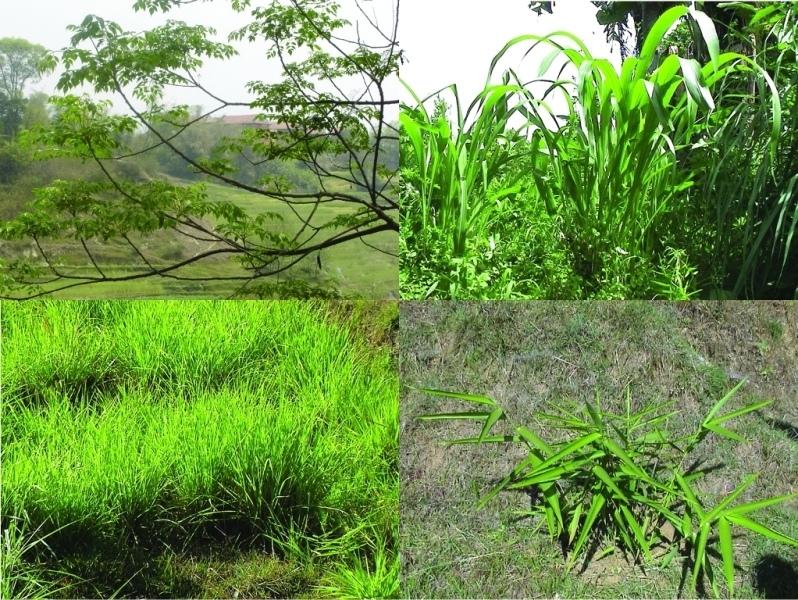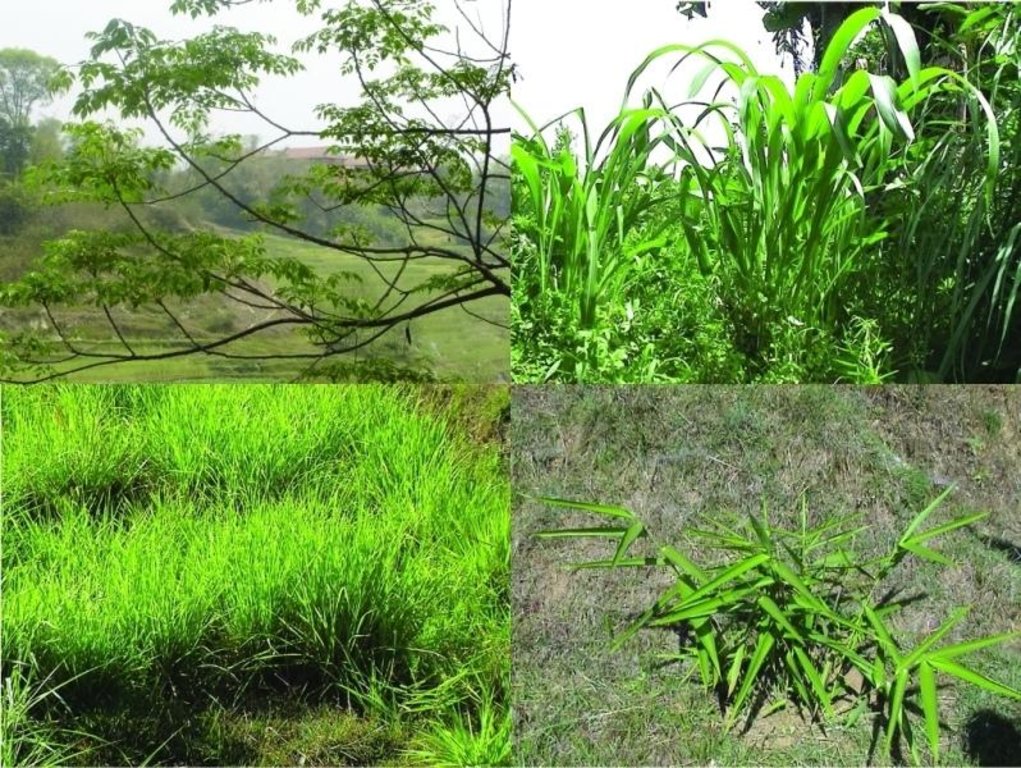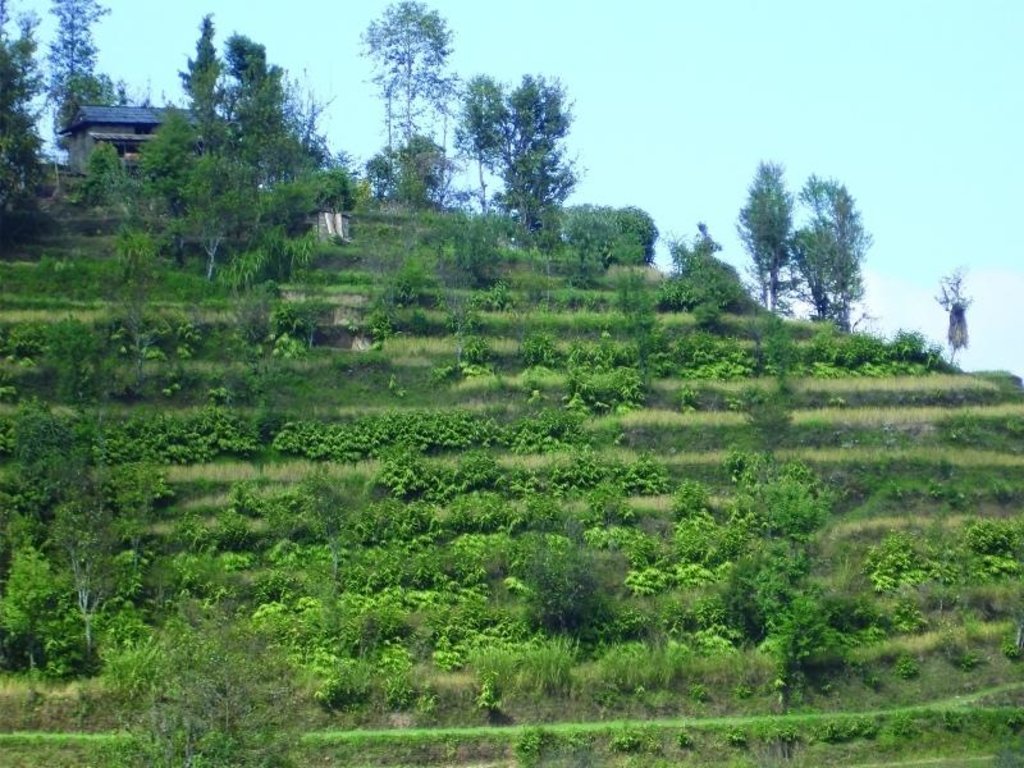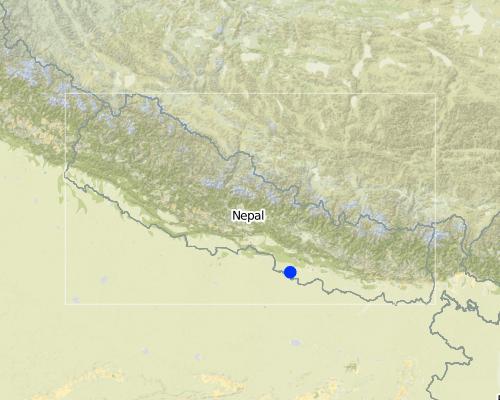Cultivation of fodder and grasses [النيبال]
- تاريخ الإنشاء:
- تحديث:
- جامع المعلومات: Richard Allen
- المحرر: –
- المُراجع: David Streiff
Dale ghans tatha bhuin ghans prawardhan
technologies_1757 - النيبال
عرض الأقسام
توسيع الكل طي الكل1. معلومات عامة
1.2 تفاصيل الاتصال بالأشخاص الرئيسيين لمصدر المعلومات والمؤسسات المشاركة في تقييم وتوثيق التقنية
متخصص في الإدارة المستدامة للأراضي:
Director
+977 1 5520314
Soil Management Directorate, Department of Agriculture
Harihar Bhawan, Lalitpur
النيبال
متخصص في الإدارة المستدامة للأراضي:
Team Leader
+977 1 5543591
ssmp@helvetas.org.np
Sustainable Soil Management Programme
GPO Box 688, Kathmandu/Nepal
النيبال
اسم المشروع الذي سهّل توثيق/تقييم التقنية (إذا كان ذلك على صلة)
Sustainable Soil Management Programme, Nepal (SSMP)اسم المؤسسة (المؤسسات) التي سهلت توثيق/تقييم التقنية (إذا كان ذلك على صلة)
Department of Agriculture, Soil Management Directorate, Hariharbhawan Lalitpur (doasoil) - النيبالاسم المؤسسة (المؤسسات) التي سهلت توثيق/تقييم التقنية (إذا كان ذلك على صلة)
HELVETAS (Swiss Intercooperation)1.3 الشروط المتعلقة باستخدام البيانات الموثقة من خلال WOCAT
متى تم تجميع البيانات (ميدانيا)؟:
07/11/2008
يوافق جامع المعلومات والشخص (لاشخاص) الرئيسي لمصدر المعلومات على الشروط المتعلقة باستخدام البيانات الموثقة من خلال WOCAT:
نعم
1.5 الإشارة إلى الاستبيان (الاستبيانات) حول مناهج الإدارة المستدامة للأراضي
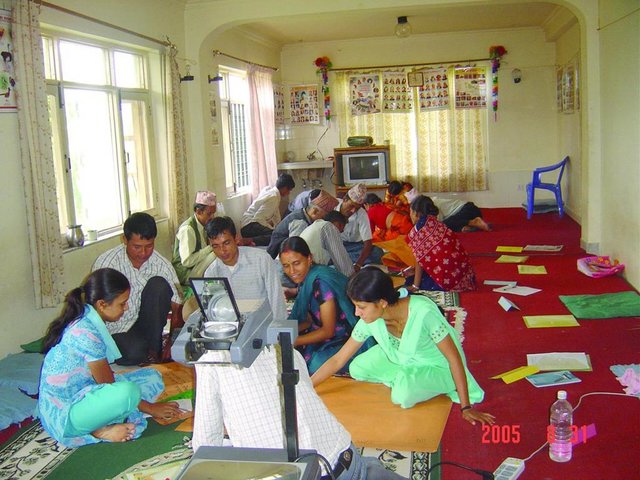
Farmer field schools on integrated plant nutrient systems [النيبال]
Participatory and collaborative learning through the farmer field school approach
- جامع المعلومات: Richard Allen
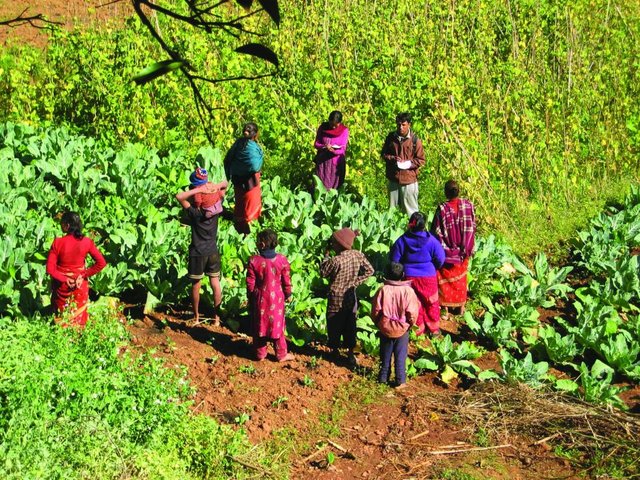
Farmer-to-farmer diffusion [النيبال]
Wider diffusion of sustainable soil management technologies through a demand responsive farmer-to-farmer diffusion approach
- جامع المعلومات: Richard Allen
2. وصف تقنيةالإدارة المستدامي للأراضي
2.1 وصف مختصر للتقنية
تعريف التقنية:
Cultivation of fodder crops on marginal lands and terrace risers
2.2 وصف تفصيلي للتقنية
الوصف:
Fodder plays a major role in the crop-livestock-manure-soil nutrient cycle on farms in the middle mountains of the Himalayas. Livestock convert fodder shrubs and grasses from the forest, crop residues, and other fodder into manure through digestion. However, in the middle hills of Nepal the lack of availability of good quality fodder often limits not only, the productivity of livestock, but also reduces the nitrogen content of animal dung if, for example, only cereal crop residues, are fed to the animals.
In earlier times, livestock were left to graze in the forests and on community lands. The animals sought out their own food and were only assembled for milking and to protect them from wild animals. With the introduction of stall-feeding, the demand for fodder has increased greatly with a subsequent large increase in women’s workload as it is they who are responsible for collecting the fodder.
Most fodder is collected in forest areas, and most livestock manure is applied to arable land, in particular to rainfed fields. This results in a net transfer of nutrients from forest areas to arable lands. It is estimated that, in this way, about 3 to 7 ha of forest land is needed to maintain 1 ha of arable land without degrading the state of the forest. In addition to reducing the availability of forest resources, the widespread closure of community forests has diminished access to fodder during certain times of the year. All this is putting serious pressure on the remaining unprotected forest resources.
Marginal lands and terrace risers offer an opportunity to reduce this pressure. The planting of grasses and shrubs suitable for fodder on these areas not only increases fodder availability but also reduces erosion and landslides that originate in these areas. If leguminous fodder species are planted, they increase soil fertility by increasing the nitrogen content in soils.
2.3 صور التقنية
2.5 البلد/المنطقة/المواقع التي تم تنفيذ التقنية فيها والتي يغطيها هذا التقييم
البلد:
النيبال
Map
×3. تصنيف تقنية الإدارة المستدامي للأراضي
3.1 الغرض الرئيسي ( الأغراض الرئيسية) للتقنية
- تحسين الإنتاج
- الحد من تدهور الأراضي ومنعه وعكسه
3.2 نوع (أنواع) استخدام الأراضي الحالية حيث يتم تطبيق التقنية

الأراضي الزراعية
- زراعة سنوية
التعليقات:
Major land use problems (compiler’s opinion): Increasing livestock numbers causing the degradation of unprotected forest areas. The closure of large areas of community managed forests to grazing and fodder collection is putting more pressure on unprotected forest areas and increasing the demand for alternative sources of fodder and better quality fodder.
3.4 مجموعةالإدارة المستدامة للأراضي التي تنتمي إليها هذه التقنية
- الإدارة المتكاملة للمحاصيل والثروة الحيوانية
- تحسين الغطاء الأرضي/النباتي
3.5 انتشار التقنية
حدد انتشار التقنية:
- منتشرة بالتساوي على مساحة
3.6 التدابير التقنية في مجال إلادارة المستدامة للأراضي
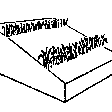
التدابير النباتية
- V2: الأعشاب والنباتات العشبية المعمرة
3.7 الأنواع الرئيسية من تدهور الأراضي التي تناولتها التقنية
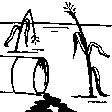
التدهور الكيميائي للتربة
- (Cn): تراجع الخصوبة وانخفاض محتوى المادة العضوية (غير ناتج عن الانجراف)
3.8 منع أو حد أو عكس تدهور الأراضي
تحديد هدف التقنية فيما يتعلق بتدهور الأراضي:
- الحد من تدهور الأراضي
4. المواصفات الفنية، وأنشطة التنفيذ، والمدخلات، والتكاليف
4.2 المواصفات الفنية/شروحات الرسم الفني
Technical knowledge required for field staff / advisors: low
Technical knowledge required for land users: low
Main technical functions: increased availability of fodder, improved manure quality & increased quantity of manure, increased soil fertility
Secondary technical functions: nitrogen fixation (if leguminous species are planted)
Trees/ shrubs species: badahar (Artocarpus lakoocha), dudhilo (Ficus nemoralis), nemaro (Ficus roxburghi), tank (Bauhinia p
Grass species: stylo (Stylosanthes spp.), dinanath (Penisetum spp.), molasses, Napier grass NB21 (Penisetum purpure
4.3 معلومات عامة بخصوص حساب المدخلات والتكاليف
حدد العملة المستخدمة لحساب التكاليف:
- دولار أمريكي
اذكر متوسط تكلفة أجر العمالة المستأجرة في اليوم الواحد:
2.00
4.4 أنشطة التأسيس
| النشاط | نوع التدبير | التوقيت | |
|---|---|---|---|
| 1. | Establish nursery for saplings/seedlings, and procure seed of appropriate species | نباتية | |
| 2. | Transplant at appropriate time on wasteland areas around houses and terrace risers as given in the Agroforestry Training Manual (NAF, SSMP 2002) | نباتية |
4.5 التكاليف والمدخلات اللازمة للتأسيس
| تحديد المدخلات | الوحدة | الكمية | التكاليف لكل وحدة | إجمالي التكاليف لكل مدخل | % من التكاليف التي يتحملها مستخدمو الأراضي | |
|---|---|---|---|---|---|---|
| العمالة | Nursing seedling | Persons/day | 3,0 | 2,0 | 6,0 | 100,0 |
| المواد النباتية | Seedlings | unit | 1,0 | 4,0 | 4,0 | 100,0 |
| إجمالي تكاليف إنشاء التقنية | 10,0 | |||||
4.6 الصيانة/الأنشطة المتكررة
| النشاط | نوع التدبير | التوقيت/الوتيرة | |
|---|---|---|---|
| 1. | Depending on species, newly established trees and shrubs need to be pruned, pollarded, or coppiced; grasses need no further agronomic practices | نباتية | |
| 2. | Replace dead plants and ones that failed to establish | نباتية |
4.7 التكاليف والمدخلات اللازمة للصيانة/للأنشطة المتكررة (سنويًا)
| تحديد المدخلات | الوحدة | الكمية | التكاليف لكل وحدة | إجمالي التكاليف لكل مدخل | % من التكاليف التي يتحملها مستخدمو الأراضي | |
|---|---|---|---|---|---|---|
| العمالة | Replace dead plants | Persons/day | 3,0 | 2,0 | 6,0 | 100,0 |
| إجمالي تكاليف صيانة التقنية | 6,0 | |||||
التعليقات:
Cost as in January 2007
4.8 أهم العوامل المؤثرة على التكاليف
قدم وصفا لأهم العوامل التي تؤثر على التكاليف:
Cost ofseeds or saplings/seedlings depends on species.
5. البيئة الطبيعية والبشرية
5.1 المناخ
هطول الأمطار السنوي
- < 250 مم
- 251- 500 ملم
- 501 - 750ملم
- 1,000-751 ملم
- 1,500-1,100 ملم
- 2,000-1,500 ملم
- 3,000-2,001 ملم
- 4,000-3,100 ملم
- > 4000 ملم
المواصفات/التعليقات على هطول الأمطار:
Annual rainfall: Also 2000-3000 mm
المنطقة المناخية الزراعية
- رطبة
Thermal climate class: subtropics
5.2 طوبوغرافيا
متوسط الانحدارات:
- مسطح (0-2%)
- بسيط (3-5%)
- معتدل (6-10%)
- متدحرج (11-15%)
- تلال (16-30%)
- شديدة الانحدار(31-60%)
- فائقة الانحدار (>60%)
التضاريس:
- هضاب/سهول
- أثلام مرتفعة
- المنحدرات الجبلية
- منحدرات التلال
- منحدرات في السفوح
- قاع الوادي
المنطقة الارتفاعية:
- 100-0 متر فوق سطح البحر
- 500-101 متر فوق سطح البحر
- 1,000-501 متر فوق سطح البحر
- 1,500-1,001 متر فوق سطح البحر
- 2,000-1,501 متر فوق سطح البحر
- 2,500-2,100 متر فوق سطح البحر
- 3,000-2,501 متر فوق سطح البحر
- 4,000-3,001 متر فوق سطح البحر
- > 4000 متر فوق سطح البحر
التعليقات والمواصفات الإضافية بشأن التضاريس:
Slopes on average: Also moderate (6-10%), rolling (11-15%) and hilly (16-30%)
Landforms: Also footslopes
Altitudinal zone: Also 1000-1500 m a.s.l. and 1500-2000 m a.s.l.
5.6 خصائص مستخدمي الأراضي الذين يطبقون التقنية
التوجه السوقي لنظام الإنتاج:
- الكفاف (الإمداد الذاتي)
- تجاري/سوق
أفراداً أو مجموعات:
- فرد/أسرة معيشية
اذكر الخصائص الأخرى ذات الصلة لمستخدمي الأراضي:
Off-farm income specification: In most farm households, off-farm income plays at least a minor and increasingly a major role. Occasional opportunities for off-farm income present themselves in the form of daily labour wages. Some households’ members receive regular salaries, whilst an increasing number of Nepalis are working in India, the Middle East, Malaysia, and elsewhere and sending remittance incomes home.
5.7 متوسط مساحة الأرض المملوكة أو المستأجرة من قبل مستخدمي الأراضي الذين يطبقون التقنية
- < 0.5 هكتارا
- 0.5 - 1 هكتار
- 1 -2 هكتار
- 2 - 5 هكتار
- 5 - 15 هكتار
- 15 - 50 هكتار
- 50 - 100هكتار
- 500-100 هكتار
- 1,000-500 هكتار
- 10,000-1,000 هكتار
- > 10,000 هكتار
5.8 ملكية الأراضي، وحقوق استخدام الأراضي، وحقوق استخدام المياه
ملكية الارض:
- فردية، لا يوجد سند ملكية
- فردية، يوجد سند ملكية
حقوق استخدام الأراضي:
- مؤجر
- فردي
التعليقات:
sharecropping between owner and tenant
6. الآثار والتصريحات الختامية
6.1 الآثار التي أظهرتها التقنية في الموقع
الآثار الاجتماعية والاقتصادية
الإنتاج
إنتاج المحاصيل
التعليقات/ حدد:
due to shading effect
إنتاج الأعلاف
جودة العلف
الدخل والتكاليف
عبء العمل
التعليقات/ حدد:
mainly for women
آثار اجتماعية واقتصادية أخرى
milk production
livestock health
manure availability
الآثار الايكولوجية
التنوع البيولوجي: الغطاء النباتي، الحيوانات
مكافحة الآفات/الأمراض
التعليقات/ حدد:
some of the new species provide inputs for organic pest management
الآثار الايكولوجية الأخرى
erosion from terrace bunds and marginal lands
need for free grazing
incidence of rodents and snakes
6.2 الآثار التي أظهرتها التقنية خارج الموقع
pressure on forest resources
6.4 تحليل التكلفة والعائد
كيف يمكن مقارنة العوائد نسبة لتكاليف الإنشاء (من وجهة نظر مستخدمي الأراضي)؟
عوائد قصيرة الأجل:
إيجابي
عوائد طويلة الأجل:
إيجابي
كيف تتم مقارنة العوائدمع كلفة الصيانة/التكاليف المتكررة (من وجهة نظر مستخدمي الأراضي)؟
عوائد قصيرة الأجل:
إيجابي
عوائد طويلة الأجل:
إيجابي
6.5 اعتماد التقنية
من بين جميع الذين تبنوا التقنية، كم عدد الذين فعلوا ذلك بشكل تلقائي، أي دون تلقي أي حوافز مادية/مدفوعات؟:
- 90-50%
التعليقات:
Comments on spontaneous adoption: 80% of the Sfarmers exposed to this technology by SSMP adopted it. 30% farmers with or without direct reference to fodder promotion) have planted a variety of new fodder species About 10% of local farmers not involved in SSMP have adopted the technology.
6.7 نقاط القوة / المزايا / الفرص التي توفرها التقنية
| نقاط القوة/ المزايا/ الفرص من وجهة نظر جامع المعلومات أو غيره من الاشخاص الرئيسيين لمصدر المعلومات |
|---|
| Improves fodder quantity and quality with a positive impact on livestock health and productivity |
| Increased fodder availability near the house reduces the workload of women to collect fodder and grass for livestock |
| Feeding of improved fodder and grasses improves quality of farmyard manure and thereby reduces need for mineral fertilise |
| Different species provide source of mulching and staking material |
6.8 نقاط ضعف / مساوىء / مخاطر التقنية وسبل التغلب عليها
| نقاط الضعف/ المساوىء/ المخاطر من وجهة نظر جامع المعلومات أو غيره من الاشخاص الرئيسيين لمصدر المعلومات | كيف يمكن التغلب عليها؟ |
|---|---|
| In places fodder grasses and shrubs have increased the incidence of rodents and snakes | select appropriate species; pruning and pollarding to manage height of the plants |
| Shading effect on fi eld crops | only plant such species on wastelands or along river banks |
| Host of insect pests | |
| Some species (e.g. bamboo, eucalyptus) have alleopathic effects that inhibit the growth of crop and other plants |
7. المراجع والروابط
7.2 المراجع للمنشورات المتاحة
العنوان، المؤلف، السنة، النظام القياسي الدولي لترقيم الكتب ISBN:
NAF; SSMP (2002) Agroforestry Training Manual (in Nepali). Kathmandu: Nepal Agroforestry Foundation and Sustainable Soil Management Programme
متاح من أين؟كم التكلفة؟:
SSMP
الروابط والوحدات المواضيعية
توسيع الكل طي الكلالروابط

Farmer field schools on integrated plant nutrient systems [النيبال]
Participatory and collaborative learning through the farmer field school approach
- جامع المعلومات: Richard Allen

Farmer-to-farmer diffusion [النيبال]
Wider diffusion of sustainable soil management technologies through a demand responsive farmer-to-farmer diffusion approach
- جامع المعلومات: Richard Allen
الوحدات المواضيعية
لا يوجد وحدات مواضيعية


